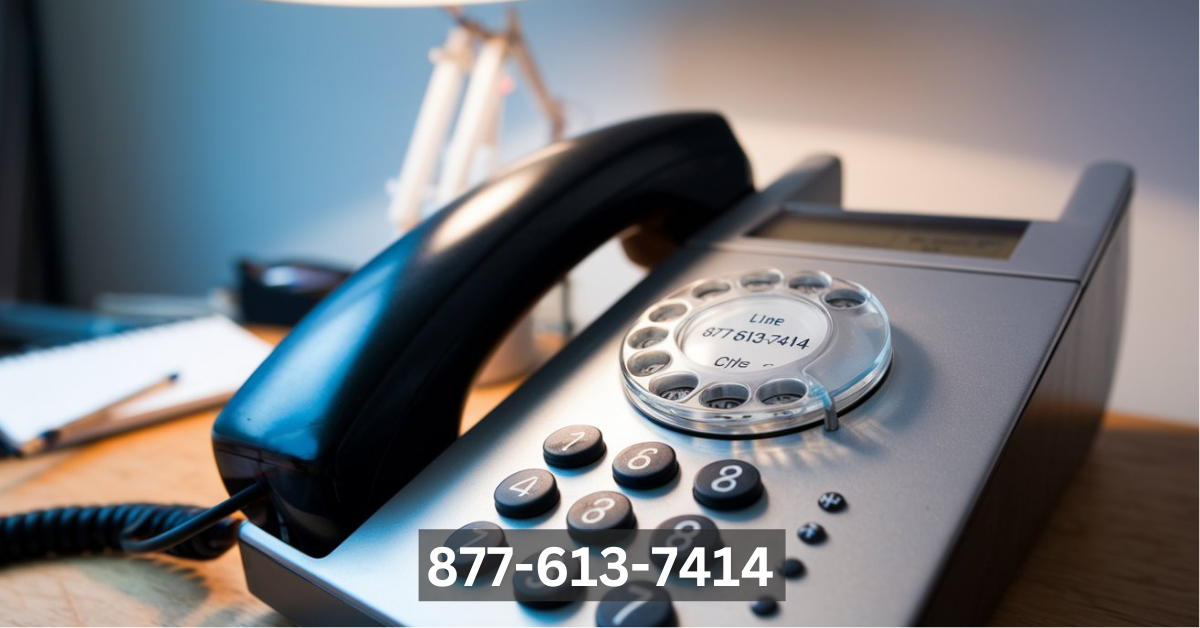In our fast-paced world, communication is crucial, and phone numbers are a primary means of connection. One number that has been gaining attention recently is 877-613-7414. If you’ve encountered this number, you might be wondering what it is and who might be calling you. In this article, we’ll delve into everything you need to know about this toll-free number, its implications for consumer protection, and how to navigate the landscape of phone communications in a safe and informed manner.
What is 877-613-7414?
The number 877-613-7414 is categorized as a toll-free number. Toll-free numbers are special telephone numbers that allow callers to reach businesses or organizations without incurring any charges. Instead, the entity that owns the number covers the cost of the call. These numbers typically start with prefixes such as 800, 888, 877, 866, and others, indicating their toll-free nature.
Toll-free numbers are essential for businesses, as they provide a barrier-free way for customers to connect. They facilitate customer outreach, enhance brand visibility, and support customer service efforts by making it easy for clients to reach out with questions or concerns.
Toll-free numbers function through a system that routes incoming calls to a designated line, allowing businesses to manage multiple calls without needing separate local numbers in various areas. This system not only optimizes customer service but also helps businesses track call metrics, enhancing their operational efficiency.
For businesses, toll-free numbers represent an opportunity to provide exceptional customer service while building trust and credibility. Consumers benefit by having a straightforward way to reach companies without worrying about long-distance charges. This convenience fosters customer satisfaction and loyalty, making toll-free numbers a win-win for both parties.
Common Callers from 877-613-7414
Types of Businesses That Use This Number
Calls from 877-613-7414 can originate from various businesses, ranging from customer service centers to telemarketing firms. Common callers include telecommunications providers, service-oriented companies, financial institutions, and non-profit organizations.
Customer Service Calls vs. Telemarketing Calls
While many businesses utilize toll-free numbers for customer service inquiries, others might employ them for telemarketing purposes. Customer service calls typically involve inquiries regarding products or services, while telemarketing calls aim to promote new offerings. Understanding the difference between these types of calls is essential for consumers to manage their phone interactions effectively.
Potential for Scams Associated with This Number
Unfortunately, the prevalence of toll-free numbers also opens the door for fraudulent activities. Scammers can use toll-free numbers like 877-613-7414 to impersonate legitimate businesses, attempting to gain sensitive personal information or money from unsuspecting victims. It’s essential for consumers to stay alert and educated about potential scams linked to toll-free numbers.
Understanding Toll-Free Numbers
Toll-free numbers come with various prefixes, including 800, 888, 877, 866, 855, 844, and 833. Each prefix serves the same purpose—allowing callers to connect without incurring charges. The expansion of these prefixes over the years reflects the increasing demand for toll-free services as businesses grow and adapt.
Toll-free numbers offer several advantages for businesses. They create a professional image, increase the likelihood of customer engagement, and enhance marketing efforts by allowing potential clients to reach out easily. Businesses can also track the performance of their toll-free lines, gaining insights into customer behavior and preferences.
While toll-free numbers provide convenience, they are not without drawbacks. Some consumers report receiving unwanted solicitation or spam calls from toll-free numbers, leading to frustration. Moreover, the use of automated calls or robocalls can be particularly intrusive, highlighting the need for effective consumer protection measures.
How to Identify Legitimate Calls
When receiving calls from toll-free numbers, it’s crucial to discern between legitimate businesses and potential scams. Legitimate callers typically provide clear information about their company and the reason for their call. In contrast, scammers may use vague language or pressure tactics to elicit personal information.
Caller ID is an invaluable tool for identifying incoming calls. If the number appears as a toll-free number, take a moment to research it before answering. Additionally, screening voicemail messages can provide insight into the nature of the call. If a message seems suspicious or doesn’t clearly state the purpose of the call, consider researching the number further.
If you decide to answer a call from 877-613-7414, don’t hesitate to ask questions. Inquire about the purpose of the call, the name of the organization, and any other relevant details. Legitimate callers will be able to provide clear answers, while scammers may falter under scrutiny.
Step-by-Step Guide on How to Handle Unknown Calls
If you receive a call from 877-613-7414 and are unsure of its legitimacy, follow these steps:
- Do Not Answer If Unsure: If you don’t recognize the number, it’s okay to let it go to voicemail. A legitimate caller will leave a message.
- Listen to the Voicemail: If a voicemail is left, listen carefully. Assess whether the message provides useful information about the caller.
- Research the Number: Utilize phone number lookup services to see if others have reported similar calls from this number.
- Block the Number: If you find the calls annoying or suspicious, consider blocking the number using your phone’s call-blocking features or third-party applications.
- Report the Number: If you believe the call is a scam, report it to the Federal Trade Commission (FTC) or other relevant agencies. Reporting helps protect others from potential fraud.
Researching unknown numbers before responding can save you from potential scams. Various online resources allow users to check the legitimacy of phone numbers, helping them make informed decisions about whether to engage further.
Block a number if you receive persistent, unwanted calls or if the calls are clearly spam. Reporting suspicious numbers to the FTC and other scam reporting agencies is crucial for consumer safety and awareness. Your report contributes to a larger effort to combat fraudulent activities.
Common Scams Linked to Toll-Free Numbers
Phone scams have become increasingly sophisticated, and toll-free numbers are often used as a disguise by scammers. Here are some prevalent scams you should be aware of:
One of the most notorious scams involves callers impersonating the IRS, claiming that you owe back taxes, and threatening legal action if immediate payment isn’t made. Remember, the IRS never initiates contact via phone for collections—always verify any such claims directly with the agency.
Another common scam involves calls from individuals claiming to be tech support representatives from reputable companies. They may assert that your computer has a virus and urge you to grant them remote access. Legitimate tech support will never initiate such calls without prior contact.
Prize scams involve callers informing you that you’ve won a contest or lottery, but you need to pay a fee to claim your winnings. Remember, if you don’t enter a contest, you can’t win a prize. Always be cautious about unsolicited claims of prizes.
Reports indicate that millions of consumers fall victim to phone scams annually, with significant financial losses involved. According to the Consumer Financial Protection Bureau (CFPB), phone scams have cost consumers billions of dollars. Awareness and education are key to combating these issues.
Protecting Yourself from Phone Scams
Protecting yourself from phone scams requires proactive measures:
- Use Call-Blocking Apps: Applications like Truecaller and RoboKiller can help identify and block spam calls effectively. These apps utilize community reports to alert users about known spam numbers.
- Be Cautious with Personal Information: Never share personal or financial information over the phone unless you are sure of the caller’s identity.
- Register with the National Do Not Call Registry: This registry helps reduce telemarketing calls, allowing consumers to reclaim their privacy.
Modern smartphones often come equipped with call-blocking features. Explore your phone settings to utilize these tools. Additionally, consider downloading dedicated call-blocking applications for enhanced protection against spam calls and unwanted solicitations.
The National Do Not Call Registry is a vital resource for consumers wishing to limit unwanted telemarketing calls. Registering your number can significantly reduce the frequency of unsolicited calls, allowing you to enjoy a more peaceful phone experience.
Reporting Scams and Fraudulent Calls
If you encounter suspicious calls, report them to the Federal Trade Commission (FTC) through their online complaint assistant. Providing details about the call helps authorities track and combat fraudulent activities.
Consumer reporting plays a crucial role in public safety. By sharing experiences with scam calls, you contribute to a broader effort to protect others from falling victim to similar scams. Agencies rely on consumer feedback to enhance their fraud prevention strategies.
Various organizations provide resources for consumers seeking assistance with scam reporting. Websites like Scamwatch and the FTC offer guidelines on identifying scams and the information needed to report scams effectively. Use these resources to stay informed and protect yourself and others from fraudulent activities.
The Future of Phone Scams and Consumer Protection
As technology evolves, so do the tactics used by scammers. Emerging trends include sophisticated phishing attacks through voice calls, where fraudsters use social engineering techniques to manipulate victims into revealing sensitive information. Additionally, the rise of automated calling systems allows scammers to target more individuals quickly, increasing their chances of success.
To combat the increasing threat of phone scams, various technologies and strategies are being developed. Telecommunications companies are implementing advanced call authentication systems to help verify the legitimacy of calls before they reach consumers. Furthermore, machine learning and AI are being employed to analyze call patterns and identify suspicious activity, enhancing consumer protection measures.
Regulatory bodies are also taking action to address the rise in phone scams. The Federal Trade Commission (FTC) and other consumer protection agencies are actively working to enhance regulations governing telemarketing practices. Increased consumer awareness is critical in this fight; educating the public about potential scams and encouraging reporting can help mitigate the impact of these fraudulent activities.
Conclusion
Understanding toll-free numbers like 877-613-7414 is essential in today’s communication landscape. These numbers serve important functions for businesses and consumers alike but also present challenges regarding scam calls and unwanted solicitations. By staying informed, utilizing available resources, and taking proactive measures to protect yourself, you can navigate the complexities of phone communications safely and confidently.
We encourage you to remain vigilant and share your experiences with friends and family to foster a community of awareness. The more informed we all are, the better equipped we become to combat the ever-evolving tactics of phone scammers.
Frequently Asked Questions
What is a toll-free number?
A toll-free number allows callers to reach a business without incurring charges, with the business covering the cost.
How can I identify if a call from a toll-free number is legitimate?
Look for clear information about the caller, ask questions, and use caller ID and voicemail screening to assess legitimacy.
What should I do if I suspect a call from 877-613-7414 is a scam?
Do not provide personal information, research the number, and consider reporting it to the FTC.
Are there apps to block spam calls?
Yes, apps like Truecaller and RoboKiller can help identify and block unwanted calls.
How can I report suspicious calls?
Report them to the FTC using their online complaint assistant to help combat phone fraud.
Stay in touch to get more updates & alerts on TGTube! Thank you



